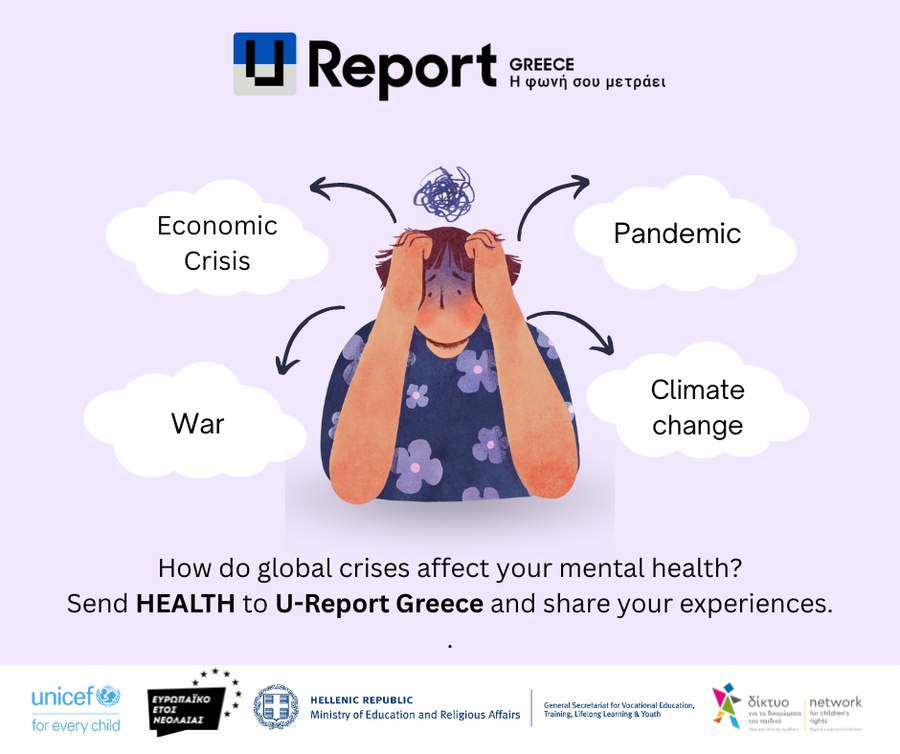The poll entitled "Youth and Adolescents’ Mental Health in
the Post COVID-19 Era" ran through UNICEF’s U-Report Greece
platform from 8 December 2022 to 9 January 2023. The poll was conducted
by the General Secretariat of Vocational Education, Training, Lifelong Learning
and Youth in collaboration with UNICEF, focusing on the feelings that global
crises (economic crisis, climate crisis, Covid-19 pandemic, war) cause on young
people living in Greece. The poll further explored young people’s desire to
overcome their fears and concerns, while providing information and guidance on
mental health support services in the country.
A total of 388 U-Reporters participated in the poll, which corresponds to a response rate of 93%. Most of the respondents (62%) were between 15-19 years old, while 12% were 20-24 years old. Girls participated more actively, representing more than half (62%) of respondents. In addition, 12% of respondents were young refugees and migrants living in Greece. The region from which most participants came was Attica, followed by Peloponnese and Thessaly.
According to the results, half of the U-Reporters (52%) describe their current mental health status as good, followed by 23% who consider it bad, 17% as very good, and 8% as very bad. Specifically, when describing their emotions, 17% mentioned anxiety, followed by 12% who chose loneliness, while 20% appeared divided, choosing depression (10%) and mental tension (10%). The rest of the emotions were reflected in the results as follows: 10% feel fear, 10% confusion, 10% irritability, and 7% constant fatigue. 14% chose some other emotion, without specifying.
Most participants (32%) said they had not spoken to anyone about their feelings during this time, while 24% said they had spoken to a friend and 21% to their family. 19% turned to a mental health professional and only 4% to their teacher. When asked whether they had sought help from a mental health professional in the past year, 48% said they had not, while 25% said yes. 11% stated that they do not know where to turn to, 9% that they intend to do so, and 7% that they are embarrassed to seek help.
Additionally, 39% of respondents cited stigma, and social and peer pressure as the main reasons preventing young people from receiving mental health services. Insufficient information (18%) and the financial cost of mental health services (18%) follow. Also, the difficulty of accessing services is an inhibiting factor for 11%, while 12% of respondents indicated that it is not a priority of regional or central authorities. Only 2% reported a lack of qualified mental health professionals.
44% of participants believe that the fact that the new generation is coming of age in an environment of global crises will help them become more assertive and participative. 19% consider the opposite, while 37% stated that they do not know. In addition, 70% of participants reported that their dreams have a long-term horizon, 17% that they only think in a shorter-term context, and 13% that they do not dream about the future.
Regarding the specialized mental health programs and services available in Greece, 42% stated that they are aware of them, 34% that they are not sure ,and 24% that they do not know them. 17% of the participants consider confidentiality as the most important aspect of mental health services, 12% the friendly and courteous staff, 8% the quality of services, and 6% their financial cost. More than half (57%) selected all the above items.
Finally, when answering where they would prefer to receive mental health services, most U-Reporters (41%) prefer at school/university or other educational structure, followed by those who would like to receive such services in their municipality/city (25%), their neighborhood ( 13%), online (13%), on a helpline (5%) or at work (3%).





